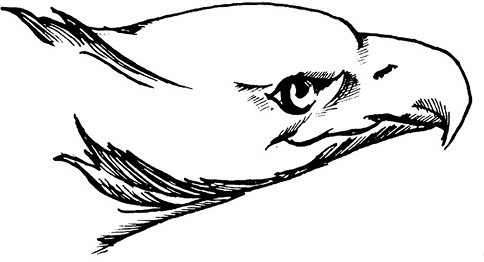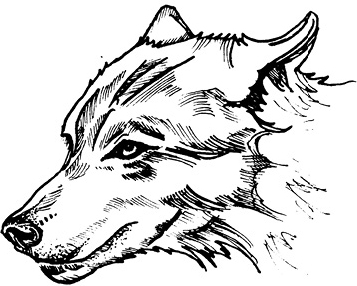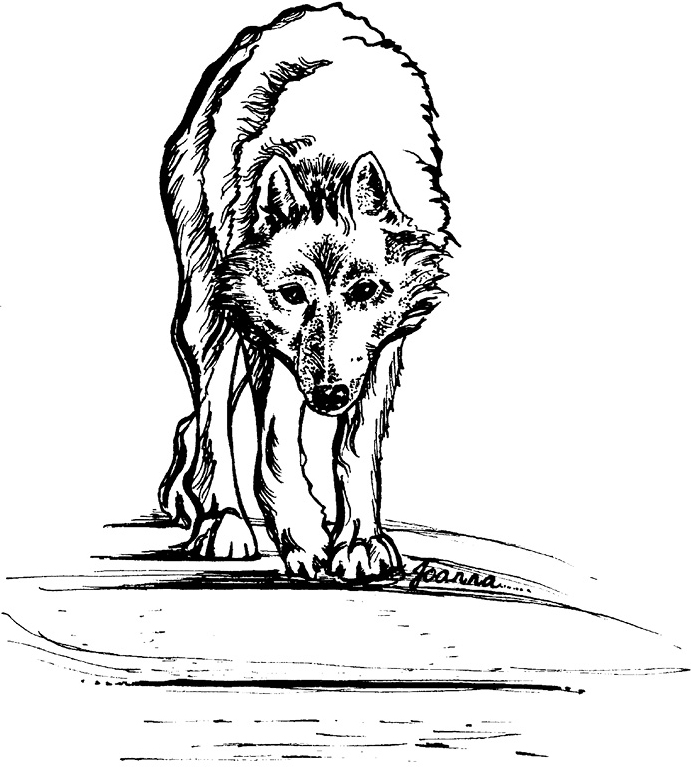
Fair Game
wolf, a dappled ghost
you glide through tree-shadowed
sand lay tracks in my mind
“The hatred has religious roots: the wolf was the Devil in disguise. And it has secular roots: wolves killed stock and made men poor. At a more general level it had to do, historically, with feelings about wilderness. What men said about one, they usually meant about the other. To celebrate wilderness was to celebrate the wolf; to want an end to wilderness and all it stood for was to want the wolf’s head.”
It’s hard to keep your sense of humour when you’re running away from a wild animal on a wet, stormy winter evening. More than that, it’s hard to hang onto your sense of self. That day in January 1999, I went from being a witness of nature to being a full-fledged participant. My previously comfortable relationship to the wild underwent a paradigm shift.
Before that day I wouldn’t have thought I harboured any illusions about the wildlife in Clayoquot Sound, especially not about the wolves. “The wolves wouldn’t confront me,” I told people. “But I never let my dog anywhere near them; they would attack her, maybe kill her.”
Over the years I have seen a lot of wolves—one of the privileges of a lifestyle that can otherwise be considered basic—even primitive. And while life on a floathouse isn’t push-button—there is firewood to cut, drinking water to carry, a composting toilet to attend to, storms to endure, open-boat travel in all conditions—it is always rewarding for those with an interest in wild places.
In Maltby Slough, bald eagles nested close by; river otters swam past in gregarious troupes, chattering to one another, blowing bubbles under the floathouse; baby harbour seals hooted for their mothers with heart-rending pleas, while the adults—slick and silver—sometimes leaped out of the water in the light of the full moon. My appreciation was enhanced by the fact that these animals seemed to completely ignore me. My floating home and I merged with their landscape and there was harmony, it seemed. I assumed the voyeur’s role with gravity, observed and enjoyed many moments, but the pinnacle of that enjoyment came not long after I’d first moved to Maltby Slough, the first day I saw the wolves.

I wrote about them at the time, describing how, at low tide, six wolves had spent two hours on the mudflats outside my house, playing with one another. It had been a beautiful morning, the liquid cry of a loon spreading across the low-tide landscape, echoing slightly in the quiet, wide-open space. Light from the rising sun glowed warm and yellow. And into this scene had trotted a wolf. Just like that, casually.
Clamping the binoculars to my eye sockets so tightly that they initially fogged up, I could see that it was truly a wolf, not a dog: tall and grey, with a moon-pale face and a reddish tinge behind the ears. Slim, but muscular, the understated power in its hind legs was apparent as it trotted, or rather, floated, across the beach.

Within twenty minutes four more wolves had arrived and together they played in the sun, running down the mudflats, unconcerned by the openness. They swam across the channel, then swam back again. They seemed to be waiting for something. Eventually a much larger wolf appeared. The younger wolves then laid an ambush for him and I watched as they squirmed with suspense and gave the game away by pouncing too soon, smothering him with their enthusiasm. One young wolf observed a seal in the water and followed it as it swam slowly in the direction of my house, the seal observing the wolf with an equivalent amount of curiosity. They were only sixty feet away from me when the wolf realized that the rest of the clan had left and that he’d better rush to catch up with them. At the time, my final paragraph was imbued with awe. I wrote: “They melted into the shadows of the forest that morning, in the place where, not long ago, I had seen a bear. And they faded so sublimely that it’s no wonder they seem mythical.” As an introduction to living alone in Maltby Slough, it wasn’t a bad place to begin.
Since that time, I have seen the wolves on many occasions. Once, at an extremely low tide, two of them squelched down to the water’s edge by the house, barely fifteen feet from me as I squatted, motionless, on the doorsill. Other times they have appeared to me audibly as mournful songs in the moonlight. The winter before I first saw the wolves, a nearby family lost a dog to marauding wolves. Their other dog survived, but was badly hurt. Then, in the spring of that year, my neighbour’s dog was attacked by a wolf.
The dog, Star, had been roaming the island behind my floathouse. A small dog of blue heeler and pit bull parentage, she had spent the better part of that morning barking in the forest, the wilderness equivalent of announcing, “here I am!” or “free hot-dogs!” over a loudspeaker at a ball game. I had already shouted into the bush in the hopes of calling her or quieting her, but that hadn’t worked. When I heard a loud scuffle, I presumed she was chasing something, but it didn’t take long to realize that, in fact, something was chasing her. Fortunately she maintained good survival instincts and I was already preparing the boat when she barrelled out onto the shore with a young-looking wolf biting the scruff of her neck.
The two of them screeched to a halt when I stood up in the boat and yelled. Star then managed to scuttle to the water’s edge, a bare ten feet from me. For almost thirty seconds the attacking wolf stood, hesitating, yellow eyes flicking back and forth between Star and me. Then my own dog spoke. It wasn’t a loud bark, but it was deep and intent, clearly a warning. Standing up on the dock, Sweetheart was larger than the wolf, a fact that seemed to tip the scales of decision. The wolf retreated, but reluctantly, looking back often as I pushed the boat to the shore and picked up its trembling domestic cousin.
Apart from a few scratches and a coating of wolf saliva on her shoulders and haunches, Star was remarkably unscathed. As I examined her, I kept an eye on the forest, following the noise of the wolf as it crashed through dense salal. The tide was low enough for the wolf to leave the way it had come, across the mudflats to the main shoreline. After it crossed over, I continued watching, still waiting to see if other wolves were involved. Sure enough. Ten minutes later, the second wolf stole across the mud, furtive and quick, like a curl of smoke.
They say it is a technique the wolves have: only one animal reveals itself at first. This lessens the threat, makes a dog feel bold, inquisitive, more likely to approach the wolf. This way the other wolves do not have to stray too far from cover. Once lured to the forest, the dog does not stand a chance if there is an entire pack waiting. A friend once observed two wolves interacting with several river otters across the bay near here. The otters easily escaped into the water, after which nine more wolves filed out of the forest and continued travelling along the shoreline.
Do wolves differentiate dogs from other prey animals—seek them out for some kind of vengeance? The matter is often thought to be an issue of rivalry or dominance. It does appear that domestic dogs trigger a definite reaction among wolves, but in Interactions of Wolves and Dogs in Minnesota, a study by Steven H. Fritts and William J. Paul, it was also discovered that in fourteen out of nineteen cases, the dogs were partially or fully eaten, suggesting physical need. Something else sets the behaviour apart, because the study also notes that:
While preying on dogs, wolves displayed a lack of fear of humans and buildings that is otherwise unknown except when they are diseased, disabled or preying on deer. In several incidents investigated, wolves evidently focused their attention on dogs so intently that they were almost oblivious to buildings and humans. Most wolf attacks on dogs occurred within the property owner’s yard and, with only two exceptions, within a hundred metres of the owner’s house. In one case, a wolf attacked a dog near the doorstep and would not retreat until beaten with a shovel. This incident occurred after the owner had recently lost another dog and neighbours had, allegedly, lost two dogs. Four fatal interactions involved dogs chained to a residence or a doghouse. In those instances, the dog’s collar was broken and the dog was carried away. In one case the doghouse was dragged into the adjacent woods with the dog carcass.
Perhaps, to adopt the wilderness metaphor of Barry Lopez, by attacking tame dogs, the wolves are making a statement, casting their vote in favour of continued wilderness.
I knew that wolves often attacked dogs, and I equated the rivalry to that of human street gangs—found it normal. Domestic dogfights are violent, too. But previously, wolves had always run away from me, never toward me. I didn’t expect that they would overcome their fear of humans to get to a dog; that I would come between them, become the protector of my dog and thereby her reluctant proxy in the rivalry. I had yet to discover that just because I don’t go looking for trouble, doesn’t mean that trouble won’t find me, and that if I slip up and make myself vulnerable then I am nothing other than fair game. Retrospectively, my earlier easy confidence in the bush was naïve—ridiculous. Is there a single creature that does not constantly fear for its life? How privileged I must be to sleep without fear, eat without fear, play without fear.
It was rainy and windy, that day in January, two years after I had first seen the wolves. I was on the mudflats, cutting firewood with the chainsaw, about half a kilometre from the floathouse. Because it was low tide, I had paddled there by canoe, unable to take the motorboat through the now-shallow channels. It was late afternoon, a poor time of day to have embarked on such a project.

Unfortunately the log was resting on the divide between firm sand and sticky mud. When I’d hauled the canoe up to the log, I’d had to pull each foot from the mud with my hands. And now each round of firewood was going to have to be carried across that mud, up the rocks of the nearest islet. That way I could come back for the wood with the motorboat when the water was deeper. The islet is a short distance from the main shoreline, but at low tide the mudflats connect them. It was just after I had carried up the sixth round that I noticed Sweetheart’s odd behaviour: she was standing by the log, staring fixedly at the main shoreline. I followed her gaze and saw a large wolf trotting toward us over the mud.
My heart sank. The familiar grey fur blended well with the rest of the picture: the mud and the rain and the dimming light. I might not have seen the wolf without the sandy-red tint around its neck. Unlike mine, the wolf’s feet moved easily over the mud, and they moved with confidence, purpose. This wolf was different from those I usually saw; it was more substantial—an easy match, visually, for Sweetheart’s eighty-five pounds.
I considered firing up the chainsaw to see if it would frighten the wolf, but in reality the sound of the saw had probably drawn attention to us in the first place. I only had a limited period of time in which to leave, and really, that was what I had to do: remove the attraction; get my dog out of there. I didn’t have time to play around with saws; I grabbed the canoe with one hand and the dog with the other. Miraculously my feet didn’t stick in the mud this time and we moved smoothly, calmly down to the water.
The wolf was still approaching. The distance was closing. I pushed off, into the shallow water, but at that instant a gust of wind caught the canoe broadside and swept us into even shallower water. The canoe swished aground. This was silly. The wolf could trot through the water more swiftly than I could paddle.
I sighed. I would be a poor second in a fight and I didn’t want the situation to reach that point. I stood up in the canoe and yelled, raising the paddle over my head to appear large and threatening. I stared at the wolf. His pace slowed. Then I stepped out of the canoe, turned my back to the wolf and started wading, towing the canoe behind me, Sweetheart standing up in it, motionless, staring at the wolf. By the time I reached a small sandbar, the wolf realized that the window of opportunity had slipped away and he stopped.
I waded on, the wind throwing handfuls of rain into my face, muddy water sluicing down my gumboots, my breath coming heavily even though I was keeping my pace deliberately moderate: what if the rest of the pack decided to venture out? I would need more energy. My thoughts narrowed to a tunnel that saw the quickest route home, the behaviour of the wolf, the possible approach of other wolves. I waded, tried paddling, then waded some more. Not until I was half a kilometre from the floathouse was I able to paddle across the channel and tie up the canoe. The trip had taken about twenty-five minutes. In all that time Sweetheart had never moved.
When we got out onto the dock she continued her vigil, sitting in the rain, staring, as if by having turned around to look at the wolf, she had somehow transformed into the legendary pillar of salt. I dried her off and locked her in the house. It was getting late and the tide was rising. I had to go back for the chainsaw or it would soon be submerged. My still-shaking hands pulled the cord of the outboard motor and I took the motorboat back across the water, searching the shoreline for the wolf—although, whether it was there or not, I still had to retrieve the saw. The flooding tide gave just enough depth to allow the motor clearance over the eelgrass beds. I beached the boat and squelched up to the saw, pausing to examine the line of wolf tracks. As expected, there was no deviation in the track line, no hesitation or second thought; the wolf had taken the shortest route possible to reach us—a straight line. It was pitch black when I got home the second time. There was mud all over everything and I was soaked and stiff with exhaustion. My expedition had been successful but for a few rounds of firewood. I had been fortunate to come out of such an important lesson unscathed.
In the week leading up to this adventure, four dogs had been killed by wolves in the nearby village of Ucluelet. Fear and resentment had boiled over quickly. There were instant cries for the wolves to be “deported.” In a letter to the local newspaper, the owner of one of the dead dogs wrote: “I am in the midst of taking appropriate steps to protect our residents, my new pup and myself. I will not for one second hesitate to shoot any or all of these wolves when they return, and they will.” The hysteria had started.
I sat at home and pondered my own reactions. I was never worried about the wolf being interested in me, but I knew I would have been unable to break up a fight between him and the dog—except maybe with the chainsaw or the axe. When I broke my thoughts down further I realized that I was uneasy about the fact that my presence had become insignificant to the wolf in light of the greater attractant, the dog. The canids were ignoring the Homo sapiens. In my arrogant human way, it shook me that the wolf had been so bold. It also bothered me that the wolf, or wolves, had been watching me without my knowledge, spying on me, ironically, just as I have spied on them: Are they watching me right now? I wondered. If so, where are they? Will I ever feel comfortable in the bush now?
Added to this was the nocturnal howling that had started going on, loud and long, just a stone’s throw away, on the island behind the house. It was as if they were taunting me. “Go away and leave us alone!” I shouted one night, as their eerie songs penetrated my dreaming and my waking. On one of those nights, clear as a bell, I could see why humans fear wolves, why they have persecuted them, made them out as wicked beasts. I could do that too. I could cry for the deportation of the wolves; I could get a rifle…
But to live out here, I have to live with wildlife, not against it; I have to experience the beauty and the violence; I have to be part of the circle—accept that at some moments, when the wheel turns, my position will be lowlier than that of others. I have to take care, guard my territory and myself, just like the rest of the animals do—every minute, every second. After all, there really is no big bad wolf; there is only life.